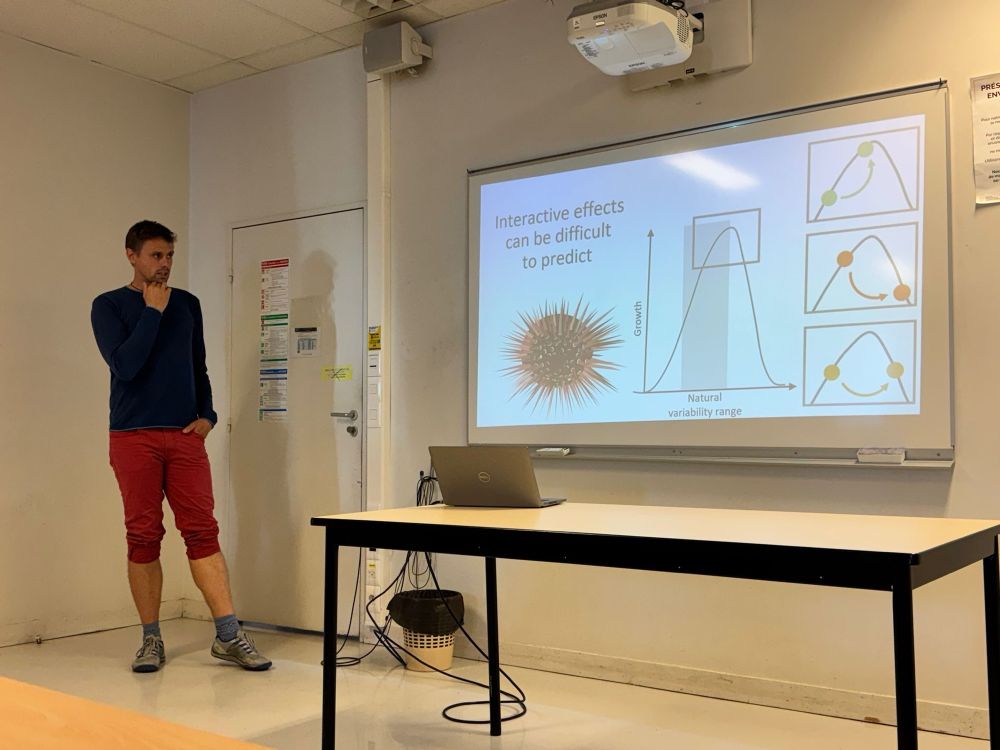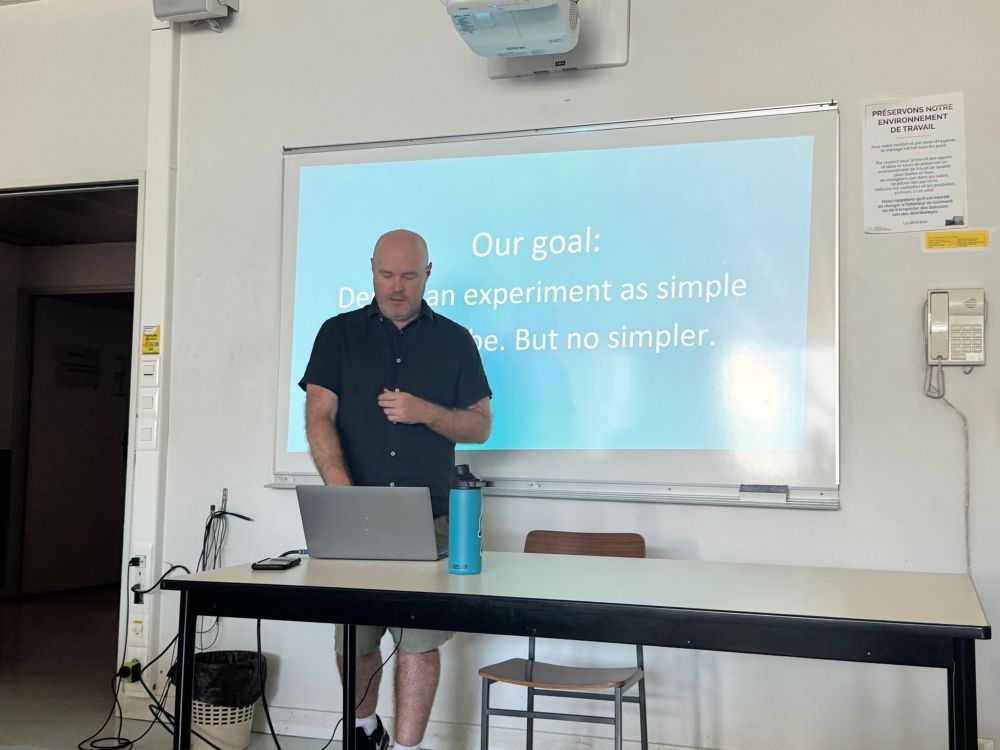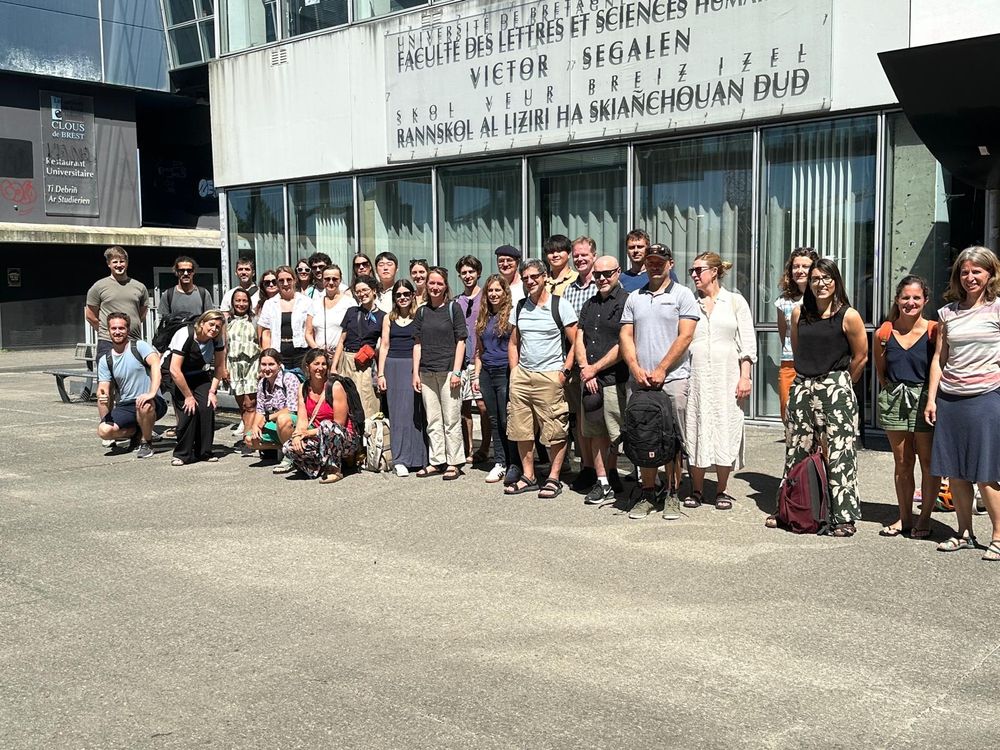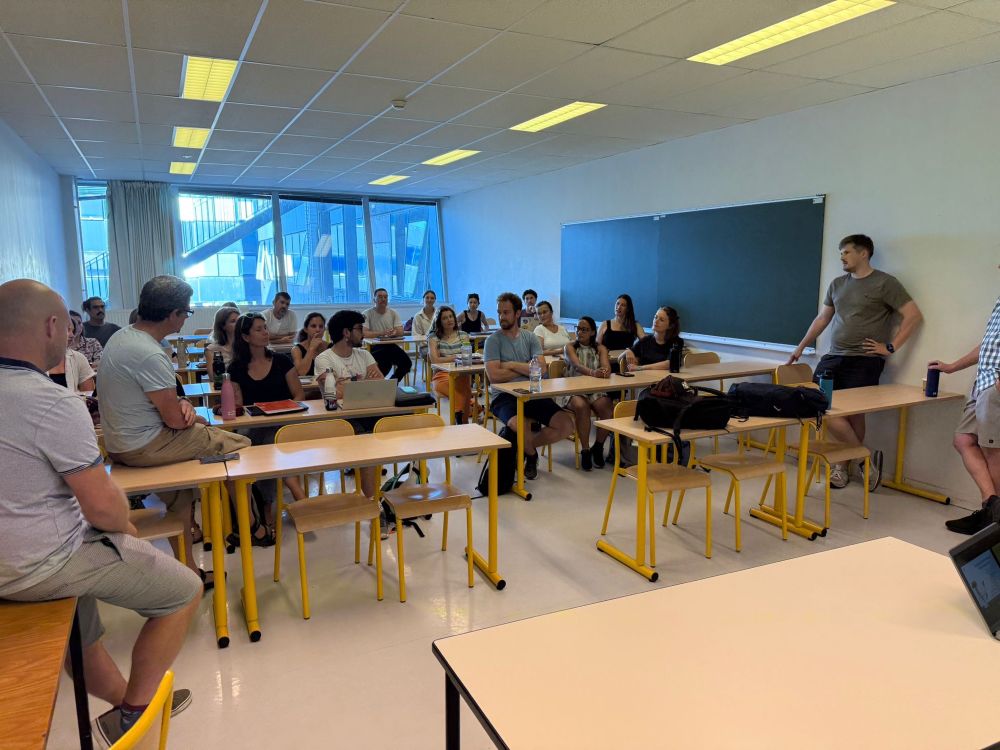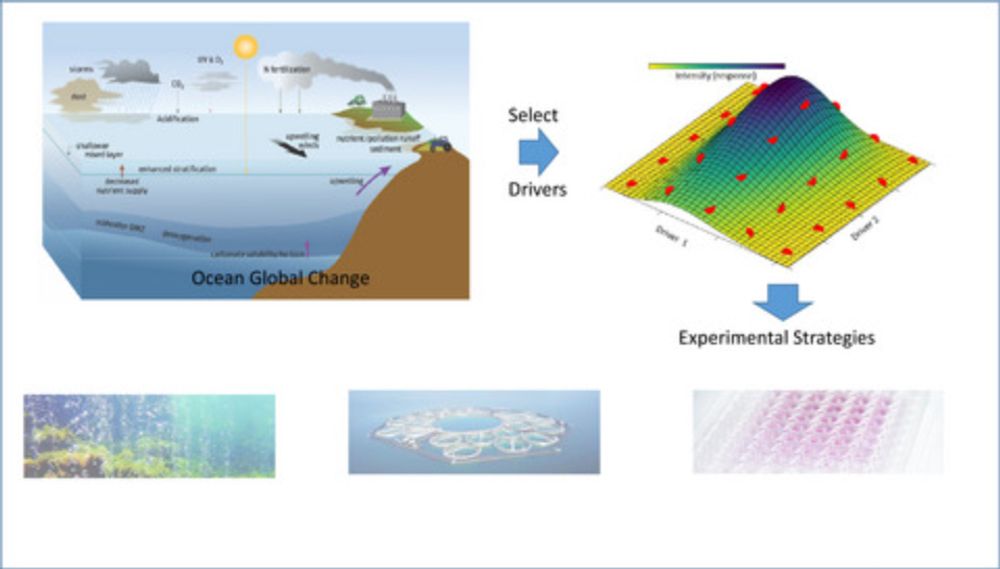The workshop is aimed at PhD students and ECRs new to multiple driver experiments, and is free but has limited spaces available.
11.12.2025 13:03 —
👍 0
🔁 0
💬 0
📌 0

Date and time: 9:00–15:30, Sunday, February 8, 2026
Location: University of Glasgow, room details TBA
Title of the event: Designing multiple driver experiments
Conveners: Sinéad Collins, University of Edinburgh, Simin Gao, University of Edinburgh, Paul Renaud, Akvaplan-niva
Description: The MEDDLE resources were developed to help researchers design and carry out tractable and comparable multiple driver experiments. In this workshop, participants will learn how to use these resources to design multiple driver experiments. While the concepts and methods discussed can apply to many systems, examples used during the workshop will focus on manipulative experiments rather than observational data.
The workshop is geared mainly towards PhD students, postdocs, and ECRs new to multiple driver research, and focuses heavily on the rationale of different experimental designs, and analysis strategies for multiple driver experiments. A basic working knowledge of statistics is needed (regression analysis), and statistical analysis examples will use R. Participants should bring a laptop with R and R studio installed.
Topics include:
• Defining a research question
• Identifying relevant drivers
• Identifying biological traits and responses
• Experimental designs for multiple driver experiments
• Statistical analysis plans
Hosted by the SCOR project “Changing Ocean Biological Systems”, this free workshop will be led by Sinéad Collins, University of Edinburgh (UK), Simin Gao, University of Edinburgh (UK), Paul Renaud, Akvaplan-niva (Norway). Spaces are limited. If you would like to attend, contact Sinéad Collins (s.collins@ed.ac.uk) by January 15, 2026 to register your interest. Limited to 24 people, so please register early!
Please include a brief (<150 words) statement outlining (a) your experience carrying out Ocean acidification or multiple driver experiments (if any) and (b) how you plan to incorporate multiple driver experiments into your work
The COBS working group is offering an experimental design workshop before Ocean Sciences in Glasgow in Feb 2026! 🌊
Join us for a day of learning about designing and analysing multiple stressor experiments without getting multiply stressed out.
forms.office.com/Pages/Respon...
11.12.2025 13:03 —
👍 7
🔁 5
💬 1
📌 0

The MEDDLE Data Analysis Guides as a Living Resource for Multiple‐Driver Marine Research
Click on the article title to read more.
Our data analysis guides for multiple stressor/driver research 🌊
@christinamcgraw.bsky.social
@sineadcollins.bsky.social
@mridulkthomas.bsky.social
@chrisecornwall.bsky.social
+ Peter Dillingham, Steeve Comeau, Sam Dupont
aslopubs.onlinelibrary.wiley.com/doi/10.1002/...
08.12.2025 13:46 —
👍 8
🔁 4
💬 0
📌 0
🌊
12.09.2025 10:13 —
👍 1
🔁 0
💬 0
📌 0
Enjoyed teaching this excellent group of young 🌊 oceanographers experimental design and data analysis!
Our teaching team was @christinamcgraw.bsky.social, Peter Dillingham, Sam Dupont, @sineadcollins.bsky.social and @mridulkthomas.bsky.social
Reach out if you'd be interested in these workshops!
03.09.2025 14:31 —
👍 2
🔁 0
💬 0
📌 0
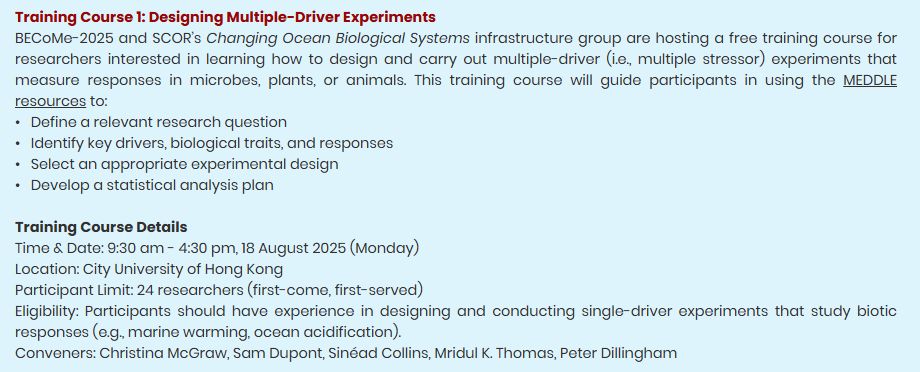
Training Course 1: Designing Multiple-Driver Experiments
BECoMe-2025 and SCOR’s Changing Ocean Biological Systems infrastructure group are hosting a free training course for researchers interested in learning how to design and carry out multiple-driver (i.e., multiple stressor) experiments that measure responses in microbes, plants, or animals. This training course will guide participants in using the MEDDLE resources to:
• Define a relevant research question
• Identify key drivers, biological traits, and responses
• Select an appropriate experimental design
• Develop a statistical analysis plan
Training Course Details
Time &Date: 9:30 am - 4:30 pm, 18 August 2025 (Monday)
Location: City University of Hong Kong
Participant Limit: 24 researchers (first-come, first-served)
Eligibility: Participants should have experience in designing and conducting single-driver experiments that study biotic responses (e.g. marine warming, ocean acidification).
Conveners: Christina McGraw, Sam Dupont, Sinéad Collins, Mridul K. Thomas, Peter Dillingham
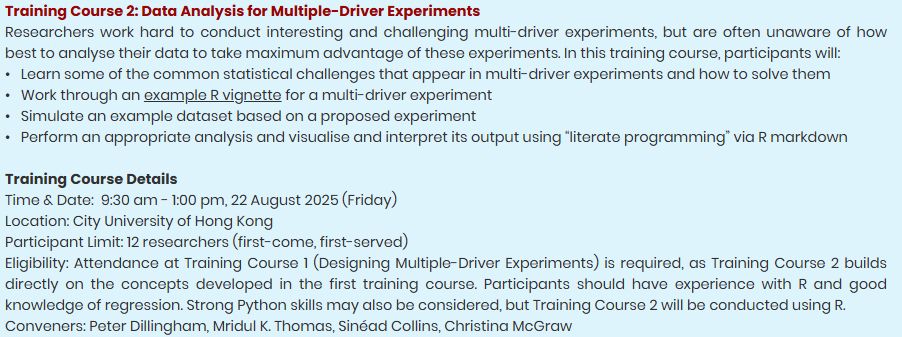
Training Course 2: Data Analysis for Multiple-Driver Experiments
Researchers work hard to conduct interesting and challenging multi-driver experiments, but are often unaware of how best to analyse their data to take maximum advantage of these experiments. In this training course, participants will:
• Learn some of the common statistical challenges that appear in multi-driver experiments and how to solve them
• Work through an example R vignette for a multi-driver experiment
• Simulate an example dataset based on a proposed experiment
• Perform an appropriate analysis and visualise and interpret its output using “literate programming” via R markdown
Training Course Details
Time &Date: 9:30 am - 1:00 pm, 22 August 2025 (Friday)
Location: City University of Hong Kong
Participant Limit: 12 researchers (first-come, first-served)
Eligibility: Attendance at Training Course 1 (Designing Multiple-Driver Experiments) is required, as Training Course 2 builds directly on the concepts developed in the first training course. Participants should have experience with R and good knowledge of regression. Strong Python skills may also be considered, but Training Course 2 will be conducted using R.
Conveners: Peter Dillingham, Mridul K. Thomas, Sinéad Collins, Christina McGraw
We will be teaching two free training courses at the BECoME-2025 conference in Hong Kong next month🌊
Course 1: Designing Multiple-Driver Experiments
Course 2: Data Analysis for Multiple-Driver Experiments
Join us! Apply through the conference website:
www.become2025.com/registration
15.07.2025 10:32 —
👍 4
🔁 2
💬 0
📌 3
We've written tutorials in R on how to analyse your experimental data. This includes how your experiment & analyses can be used to answer scientific questions and provide input into mathematical models.
bsky.app/profile/scor...
06.05.2025 14:38 —
👍 0
🔁 0
💬 0
📌 0
Feedback welcome! We plan to update these, and to add more in the future.
28.04.2025 11:55 —
👍 0
🔁 0
💬 0
📌 0
Model-averaging for experiments
7. Model-averaging, by Peter Dillingham:
Explore how model-averaging enhances the analysis of multi-driver marine experiments with nested and crossed designs, using Arthrocardia under future ocean conditions as a case study:
nzoac.nz/s/Model-aver....
28.04.2025 11:55 —
👍 1
🔁 1
💬 1
📌 0
Fitting a response surface to data from multiple-driver experiments
6. Multiple driver response surfaces, by @mridulkthomas.bsky.social and @sineadcollins.bsky.social
Learn 3 ways to analyse data from a temperature x nutrients response surface experiment, and use the output to understand where in the oceans the species does well.
nzoac.nz/s/Response_s...
28.04.2025 11:55 —
👍 0
🔁 1
💬 1
📌 1
Fitting a response curve (reaction norm) to data from single-driver experiments
5. Single-driver response curves, by @mridulkthomas.bsky.social and @sineadcollins.bsky.social
Learn how to fit a temperature response curve to a simulated phytoplankton growth rate experiment. Then use the curve to learn about how the species performs across space & time.
nzoac.nz/s/Single_dri...
28.04.2025 11:55 —
👍 1
🔁 1
💬 1
📌 1
christinamcgraw.bsky.social
4. Time-response variables, by Sam Dupont, Peter Dillingham & christinamcgraw.bsky.social
Dive into modelling time-response data with R, using a sea urchin experiment to explore how environmental factors shape growth over time:
nzoac.nz/s/Time_respo...
28.04.2025 11:55 —
👍 2
🔁 1
💬 1
📌 0
Blocking in time
3. Blocking in time, by Steeve Comeau and @chrisecornwall.bsky.social
Learn how to estimate the effects of two drivers on a response when your experiment is ‘blocked’ i.e. experimental units grouped in time, often because it’s not feasible to do all at once.
nzoac.nz/s/Blocking_i...
28.04.2025 11:55 —
👍 4
🔁 2
💬 1
📌 0
Scenario approach
2. Analysing scenarios, by Steeve Comeau and @chrisecornwall.bsky.social
Learn how to estimate the effects of two drivers on a response when your experimental treatments are designed to reflect future climate scenarios.
nzoac.nz/s/Scenario_a...
28.04.2025 11:55 —
👍 2
🔁 2
💬 1
📌 0
Power calculation using built-in R functions or via simulation
1. Statistical power, by Peter Dillingham:
Explore how to use R's built-in functions and simulations to assess the statistical power of a study on sea urchin growth under changing ocean conditions.
nzoac.nz/s/Power-vign...
28.04.2025 11:55 —
👍 1
🔁 1
💬 1
📌 0
Vignettes - Meddle
The MEDDLE data analysis tutorials illustrate statistical approaches for single and multiple driver experiments. The tutorials are not meant as an exhaustive list, nor do they replace formal statistic...
Ever wondered how to analyse your experimental data? 🌊🧪🌍
We’ve developed a series of tutorials in R to guide you through analysing & visualising data from single & multiple driver experiments.
Beginners and experts, we've got something for all of you.
Please share!
meddle-scor149.org/vignettes/
28.04.2025 11:55 —
👍 12
🔁 7
💬 1
📌 3
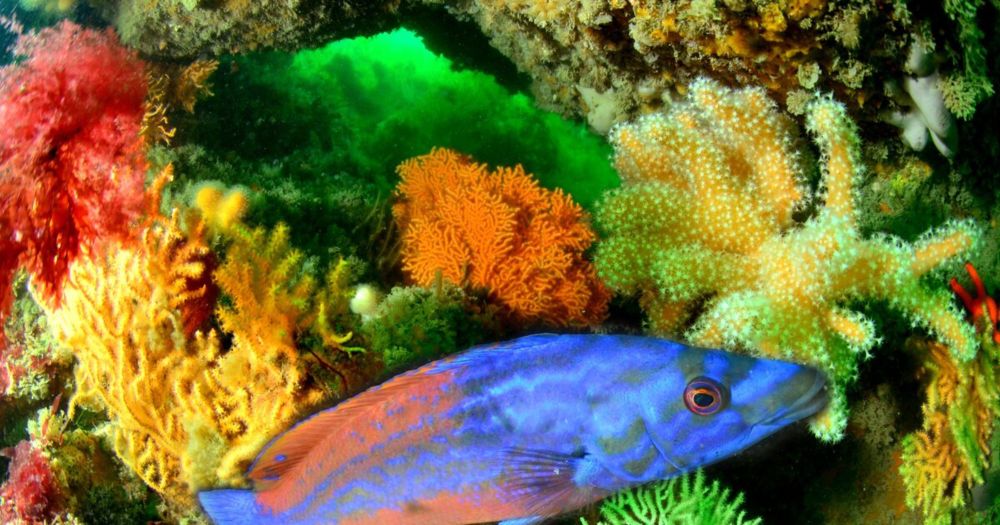
Designing multiple driver experiments – ITRS 2025
The MEDDLE resources were developed to help researchers design and carry out tractable, intercomparable multiple driver experiments. In this workshop, participants will learn how to use these…
We have a few slots free in our experimental design workshop at the International Temperate Reefs Symposium on June 30th in Brest, France 🌊
If you're attending the conference and are interested in honing your skills in climate change research/design, please sign up!
itrs-home.org/designing-mu...
25.02.2025 09:11 —
👍 5
🔁 1
💬 0
📌 0
We are excited to host a virtual workshop about how to design & conduct multiple-driver experiments for Western Indian Ocean Marine Science Association researchers.
blog.wiomsa.net/2024/12/11/v...
Applications due 23 December! Contact @christinamcgraw.bsky.social for more information.
🌊
12.12.2024 04:03 —
👍 3
🔁 1
💬 0
📌 0
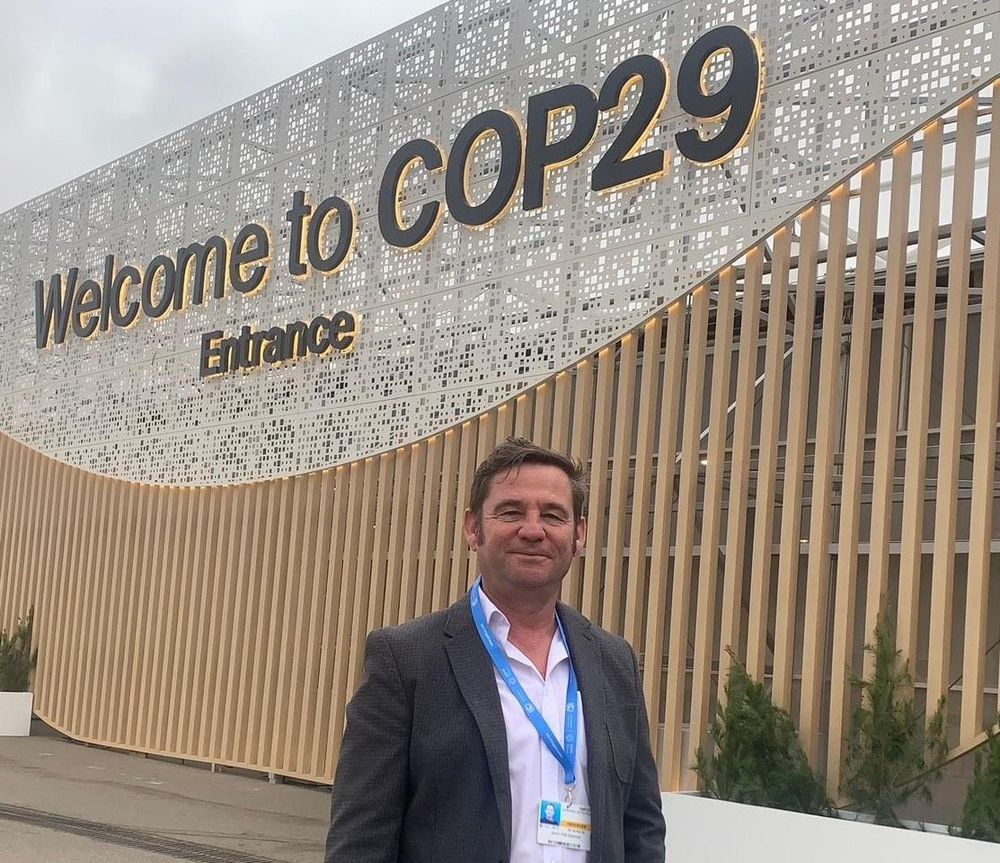
Jason Hall-Spencer at COP29
And Jason Hall-Spencer was at COP29, sharing insights on why the ocean is important for our future climate and therefore ongoing climate negotiations.
www.linkedin.com/posts/plymou...
02.12.2024 15:31 —
👍 1
🔁 0
💬 0
📌 0
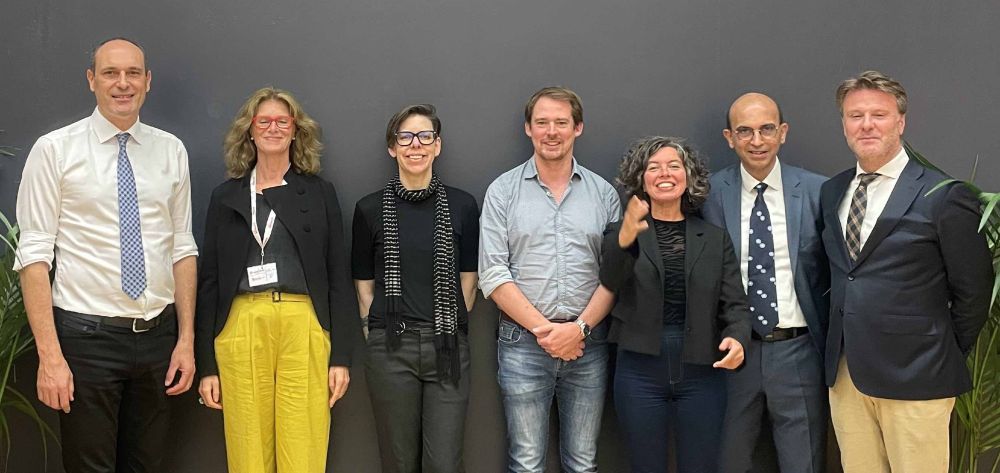
Photo of COBS members and others at the Sixth International Workshop on Bridging the Gap Between Ocean Acidification Impacts and Economic Valuation in Monaco.
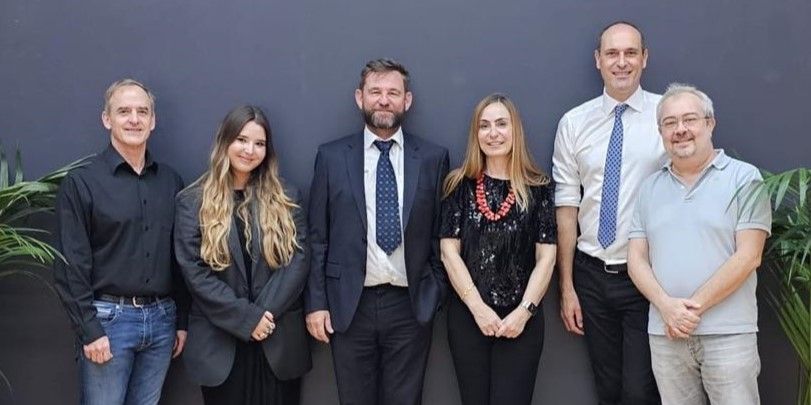
Photo of COBS members and others at the Sixth International Workshop on Bridging the Gap Between Ocean Acidification Impacts and Economic Valuation in Monaco.
Several of our members contributed to a couple of international meetings recently:
The Sixth International Workshop on Bridging the Gap Between Ocean Acidification Impacts and Economic Valuation in Monaco, organised by the Centre Scientifique de Monaco and the IAEA.
02.12.2024 15:31 —
👍 1
🔁 0
💬 1
📌 0
We are leading workshops on designing multiple driver experiments, at upcoming seaweed and temperate reef conferences 🌊
17.11.2024 14:47 —
👍 2
🔁 0
💬 0
📌 0
Thank you, and likewise! We are of course very interested in the tropics too, and had a meeting about coral reefs this past summer as well.
15.11.2024 10:10 —
👍 1
🔁 0
💬 0
📌 0
Thanks for this, David. Could you add us to the list as well?
12.11.2024 10:31 —
👍 1
🔁 0
💬 1
📌 0
Hello all! We're a working group studying how interacting drivers (or "multiple stressors") like temperature, acidification, etc. shape marine life. Follow us for new research and workshops, as well as tools to improve experimental design, data analysis, mathematical models, and more. 🌊
12.11.2024 08:08 —
👍 18
🔁 8
💬 2
📌 1
Hi David - could you please add us to the feed? Thanks!
12.11.2024 07:58 —
👍 0
🔁 0
💬 1
📌 0




